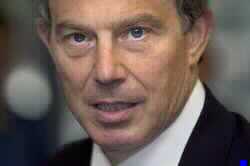HIGHLIGHTS:Downing Street Pledges to Call Parliament to Discuss Iraq if a Decision Was Taken to Attack||Blair Brakes Silence During Flight to Africa Saturday||Polls Show War Unpopular in Britain Amid Reports of Serious Rift on Issue Within Ruling Labour Party|| STORY: The British government said on Saturday military action against Iraq was not imminent but pledged to recall parliament from its summer break to discuss the issue if a decision was taken to launch a strike.
Foreign Secretary Jack Straw also said Iraqi President Saddam Hussein could act to reduce the threat of a U.S.-led military strike against him and his regime if he complied fully with international obligations set out by the U.N. Security Council.
"Military action is neither imminent, and it can be made far less than inevitable if Saddam Hussein complies with the clear United Nations Security Council obligations upon him," Straw told BBC radio.
"The option of using military force has to be there if there is a failure by Saddam Hussein to comply with the obligations."
British Prime Minister Tony Blair is expected to break his silence on Iraq on Saturday, giving the world its first chance in a month to judge whether Washington's closest ally is ready to join the United States in war.
A spokesman at Blair's Downing Street office said the prime minister was likely to speak to reporters during an 11-hour flight to Africa for a three-day trip during which he will visit Mozambique and speak at the Earth Summit in South Africa. Blair's flight took off at around 0830 GMT on Saturday.
It will be his first session with the media since late July, when Blair described Iraq as a serious threat but said no decision on whether to strike had been taken.
Since then, U.S. officials have made it ever clearer that they intend to topple Saddam, whom they accuse of seeking biological, chemical and nuclear weapons.
German and French leaders have said they would oppose any U.S. military action without a new U.N. Security Council resolution, leaving Blair isolated among top European leaders in his unwavering support for the U.S. position.
SERIOUS RIFT WITHIN RULING LABOUR PARTY
Polls show war in Iraq would be unpopular in Britain, especially among activists in Blair's own left-leaning Labour Party.
There has been talk of a serious rift over Iraq within the party when it meets for its conference in September.
Blair is highly unlikely to veer from his previous support for Washington, but there could be room for nuances in his stance that could send signals about the extent of his support in the face of domestic pressure.
There have already been differences of emphasis.
In recent days Straw has insisted that the priority for Britain is the return of U.N. weapons inspectors to Iraq, whilst Vice President Dick Cheney has said resuming inspections would be a waste of time.
Straw has also distanced himself from repeated calls by the Bush administration for "regime change" in Baghdad.
Again on Saturday, Straw repeated that "the focus has to be on the readmission of weapons inspectors."
United Nations weapons inspectors went into Iraq after the 1991 Gulf War to inspect and destroy weapons stocks. They were forced to leave in December 1998 on the eve of a U.S.-British bombing raid
PHOTO CAPTION
British Prime Minister Tony Blair is expected to break his silence on Iraq on August 31, 2002, giving the world its first chance in a month to judge whether Washington's closest ally is ready to join the United States in war. Blair is seen speaking to the press in Cumbria, UK August 1, 2002. (Pool/Reuters)
- Author:
& News Agencies - Section:
WORLD HEADLINES


 Home
Home Discover Islam
Discover Islam Quran Recitations
Quran Recitations Lectures
Lectures
 Fatwa
Fatwa Articles
Articles Fiqh
Fiqh E-Books
E-Books Boys & Girls
Boys & Girls  Ramadan
Ramadan Fatwa Audios
Fatwa Audios Month of Mercy
Month of Mercy Women
Women Eed Al- Fitr
Eed Al- Fitr Food Recipes
Food Recipes Videos
Videos

 Prayer Times
Prayer Times












